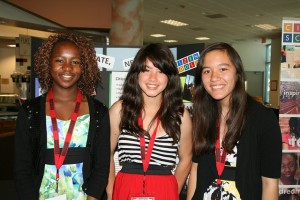CEO: Inspiring Lessons Learned from Skoll World Forum
Eric Schwarz is the CEO and Co-Founder of Citizen Schools.

As is often the case at the Skoll World Forum for social entrepreneurs in Oxford, England, which wraps up today, an artist with grit stole the show. This year it was Annie Lennox. In her heyday she was Annie Lennox and the Eurythmics. Then came decades of AIDS and anti-war activism, a family, and ongoing success (four Grammy's) as a pop star. Last night at Oxford's New Theater (one of the few buildings I was in all week less than 600 years old) Lennox performed for 1000 social entrepreneurs and other social change-agents who gather here for a remarkable annual conference that marries indignation at the injustices of the world, wonder at changes underway, and confidence that, on balance, injustice is in retreat. Man, can she sing. And, man, what a spirit.
I watched Lennox perform while sitting with Dorothy Stoneman, the veteran social justice leader who built the YouthBuild movement over the last 35 years, transforming hundreds of thousands of lives across now 268 communities. Dorothy's program works because she has an unshakeable belief in the capacity of young, poor men of color -- her core constituency -- to lift up their communities and themselves. This belief has sustained her and YouthBuild as she has built a still-tenuous funding base and continues growing and fighting for opportunity with every fibre of her being. A few rows in front of us was Cecelia Flores-Oebanda who is working to end human slavery in her native Philippines and across the world. Taddy Blecher, who sat a few rows away, is creating free universities across Africa -- free because class sizes are as large as 500 and because the students also work at a variety of university-run businesses, raising the money needed to eliminate tuition.
All around us were dozens of pioneers, finding new ways to bring education, health, jobs, water, and freedom to the world's neediest citizens.
Every year I come home from Skoll humbled by the amazing work of others, excited at the insights we are able to share, and inspired to step-up our work to reimagine and reinvent the U.S. education system. Following, in no particular order, are a few lessons I learned this year, or was reminded of, and are top of mind for me as I prepare to fly home:
- Much of the best social change work in the world is about building social networks and bridges -- bridges between farmers, fishermen and markets, as with FairTrade USA, Root Capital, and the Marine Stewardship Council; between medicine and remote villages, as with Riders for Health and their motorcycling medical delivery drivers across Africa; between different cultures and nationalities, as with Search for Common Ground and Ecopeace; and between children and successful professionals, as with Citizen Schools and INJAZ Al-Arab, which connects business volunteers to schools across the middle east.
-
Many social entrepreneurs help the "client" become a producer, building ownership, efficacy, and skill at what Citizen Schools calls the top of the triangle. Taddy Blecher and Dorothy Stoneman blur the line between student and worker as does Bill Strickland at his Pittsburgh-based Manchester Craftsman's Guild and Martin Burt at Fundacion Paraguaya.
- Social entrepreneurs are skilled at developing financial models that can scale -- pushing hard to reduce costs so they can deliver quality services at a price that communities of need can afford. For example, Debbie Aung Ding and her husband Jim Taylor, who met as civil rights foot soldiers in Mississippi, worked for years in her native Myanmar to get the price of a plastic water pump down to $13, allowing them to sell the pump and other income-producing products to 100,000 families.
- The best social entrepreneurs treat the children and families they serve with respect and trust. I learned of a new school in Chile where the outcasts from other schools learn Yoga and Meditation, eat delicious food, and learn to love their teachers -- eventually -- and only after the teachers display saintly doses of patience. The school, Fundacion Origen, has gotten the youth development and ed reform balance right, engaging and building up the youth while also delivering higher test scores and a drop-out-rate of zero, said founder Mary Ann Muller.
-
Social entrepreneurs are creative and look for solutions in surprising places. Bart Weetjens of Apopo, for instance, has trained rats how to sniff out and defuse land mines, reclaiming hundreds of thousands of acres to use again as farmland.
- Increasingly, social entrepreneurs are working in close partnership with government. In California, Roadtrip Nation, is working with the state department of Education to embed its career-exploration curriculum in high schools across the state. And individual change-makers are migrating between nonprofits and government, whether at the grand scale of Partners In Health co-founder, Jim Kim, going to run the World Bank, or the very local scale of Becky Vogel leaving Citizen Schools to run expanded learning time partnerships for The Edwards Middle School.
- While many of the flashiest projects involve direct service in remote villages or third-world cities, some of the most meaningful efforts at Skoll involve seemingly dry topics like land title reform and accounting. Global Footprint Network, for instance, is trying to establish a better accounting system than Gross Domestic Product, because GDP calculates production and consumption and does not take into full account the devaluing of the world's capital resources such as its land and water.
- I learned as well, that the world's largest companies see the world changing fast and want to be part of the change. With millions leaving poverty each year, even as great disparities remain, they see new markets opening, and they see new combinations of talent, technology, and program combining together to make change where change did not happen before. The companies want in on the action and want to help, which is why Cisco, and HP, and Google, and Twitter, and more were at the conference, eager to use their talent and their tools to make the world a better place.
-
I learned there are pockets of people all over the world who know about and draw inspiration from Citizen Schools. Two years ago I met with Louise van Rhyn, CEO and Founder of Symphonia for South Africa. Now Louise says she goes all around her country talking about the 80 percent of a child's waking hours that are out of school and the need for citizens to step up as full partners with the state in ensuring healthy futures for their children and their country. "We elected a new government," Louise told me last night, "but now we need models like Citizen Schools to get our people engaged in making our society work." Others in Japan, Colombia, and England said they are frequent visitors to our web site. Willy Oppenheim, a Rhodes Scholar and founder of Omprakash, which connects volunteers, to schools around the world, said he has drawn inspiration from Citizen Schools since his days teaching in rural Maine; he offered to push the Teaching Fellow job opportunity on his web site, which gets 13,000 unique visitors every month.
- My last lesson was about grit. We talk about how our kids will need to develop and show grit as they take on big challenges and work their way through hardships to inspiring futures. We on the staff need grit too. And we need to find ways to perpetually replenish our supply -- whether it is through listening to Annie Lennox, talking with an inspirational peer, or just spending a little more time with a child or parent or volunteer at Citizen Schools and reminding ourselves that we are helping to build a bridge to a better, fairer, more beloved future.




